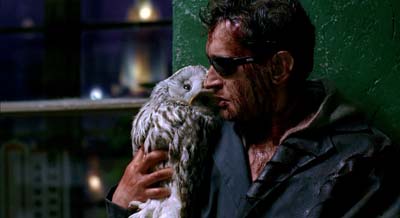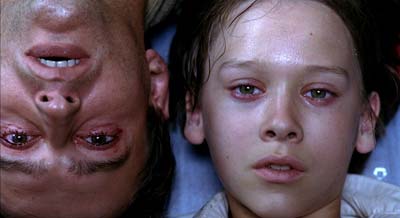Night Watch
Disappointing Russian fantasy fair. First in trilogy leaves a lot of ground to make up.

I love Night Watch. Not as a film, you understand. Actually, as a film it's quite pap. Rather I like it as a kick in the face to more than one British film magazine who have been wailing for months now something along the lines of "This will blow you away. We know because we've seen it, man.". Well, clearly you hadn't seen it, man, as rather than "blow you away" it pretty much just blows. A lesson in furious back-peddling will no doubt ensue, as for all the hype surrounding this, the first part in an intended trilogy that has broken box office records in it's native Russia, Night Watch is actually quite the disappointment. Apparently based on a series of books, the story is that old chestnut about an eternal battle between good and evil that has been fought in secret since way back in the day. A prophecy tells how the delicate truce between the two warring sides will be broken when a specially empowered "chosen one" (how original) arrives and is forced to join one faction or the other. Unspecified "wise men" say this person will choose evil for some suitably deep and meaningful reason I've already forgotten, though I suspect these "wise men" are simply attempting to overlay proceedings with an artificial sense of especially ominous foreboding.
This truce between the two sides which states neither can influence people directly to join their ranks is policed in sorts by the titular Night Watch; a group of Others (as the forces are collectively known due to their diverse range of special powers) pre-disposed to good, but forbidden from battling the forces of evil directly. One of these Watchmen is Anton Gorodetsky (Konstantin Khabensky), a young man of the present whose first encounter with the Others came about through his attempt at forcing a miscarriage upon his cheating, pregnant girlfriend through the services of a witch. Upon revoking his desire to terminate his unborn child, Anton is saved from said witch by the intervention of a group of shape-shifting Others who awaken in him his own special powers and introduce him to the Gloom; an alternate reality through which Others are able to pass for limited periods of time. If all this seems a lot to take on board then consider that the above, condensed as it already is, takes place in the first ten minutes. That this pace is pretty much continued throughout the almost two hour running time should give you some idea of just how muddled and bewildering Night Watch becomes.
The problem with this movie lies not in any one of it's ideas or themes (no matter how worn they may be), nor necessarily in the execution of these ideas individually, but in the overwhelming, overlapping combination of them as a movie. Break Night Watch down and it's clear that this is a movie that ends up decidedly less than the sum of it's parts. Visually it's a treat, making much better use of it's shadowy, insidious underworld setting than shite like, well, Underworld. The look of the film is much more gritty and realistic, as much as such a word can be applied to a fantasy tale, than the vast majority of recent Hollywood output of a similar nature, and the effects work is pleasantly on par for the course. This is arguably the biggest asset Night Watch has on hand, and is perhaps the only part of the movie that succeeds to expectation (it's certainly the only facet of this particular experience that engaged this reviewer on any level). A shame then that the rest of the movie doesn't live up to the hard work of the pixel pushers.

It's always difficult to judge performances in a production like this, especially so when dealing with something in a foreign language. For the most part the cast seem to be pulling their weight, and in spite of some overly-hammy face pulling and body popping it's hard to find much at fault. Where I suspect the problem lies, as with most things here, is in the heinously kinetic pace of the script. I suspect the players are doing the best with the material provided, but with so many characters sharing two hours at this kind of pace it's difficult for anyone to get a word in edgeways. Incidentals (for now at least; future installations promise to expand much more on every character's background) are introduced at the drop of a hat and disbanded again just as quickly. Some return briefly in time for the ending and others not at all. There are also several moments where characters seem to pop up for no reason, most noticeably in the "bus flipping" scene which in context of the movie now appears to have been inserted purely for the sake of putting something else cool in the trailer, and then are criminally overlooked later on when really they should be expanded on. Crazy, man. As a result it's hard to reach any sort of emotional or literal conclusion, even in the context of this as an opening chapter, when nobody's story arc reaches any kind of way point.
Director Timur Bekmambetov who also co-wrote the screenplay certainly has a lot to answer for. Assuming installments two and three see the light of day, which seems likely, things may all appear so much more clear and structured in hindsight. Unfortunately we're kind of obliged to deal with the here and now, and in the glaring light of present day Night Watch just comes across as an almighty mess. There's so much happening in Bekmambetov's script that you can't help wondering if he was thinking about causing synaptic overload, hoping we'd all become submissive to the suggestion that this is the best thing since sliced bread. The only thing overloaded here though is the plot, and someone could really be doing with a good sit-down alongside Peter Jackson over the topic of pace. While there are no doubt issues involved in translating such a technical script, it's hard to believe that so much was skewed in the copy from Russian to English for proceedings to make this little sense. Neither can we pin it down to cultural differences, as apparently any extraneous scenes which would be of little relevance to foreign viewers have been removed for the international release. Structurally there's certainly a beginning, a middle and an end, but the only way I can say this with any authority is because I knew the runtime before I went into the screen and timed it on my watch.
There seems little point in divulging more of Night Watch in terms of plot or technicalities, nor in ripping it apart for reaching hitherto inaccessible levels of disorganised chaos. The biggest chore here is not in sitting through such a bewildering array of disjointed set-pieces, but in recognising that somewhere, buried deep beneath the mayhem there's a decent enough yarn that might otherwise merit some of the public acclaim inexplicably ladelled upon this in it's native land. Mind you, the Russians are probably thinking the same thing about Serenity right now. The image I have in my head is of Bekmambetov as a wondrously imaginative child with too much energy and no guidance whatsoever from his parents; everything gets thrown on screen with wild abandon and no consideration for sacrificing the source material in favour of a digestible, well-structured and most importantly enjoyable viewing experience. I'd love to be able to say I hold out hope for future installments, but viewing Night Watch objectively makes it very difficult to do so. Clearly everyone involved here would like to consider this a Lord Of The Rings trophy contender. My advice is if you're going to hunt Peter Jackson you'd better be packing that magic silver bullet, not this redundant scattershot.
I award this movie 2 out of 5 Units We Use
Viktor Verzhbitsky (Zavulon)
Galina Tyunina (Olga)
Dmitry Martynov (Yegor)